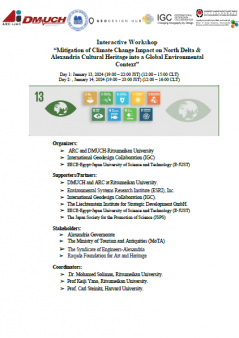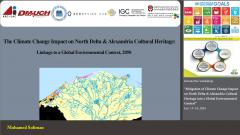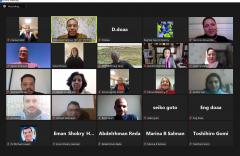-
The Interactive Workshop 'Mitigation of Climate Change Impact on North Delta & Alexandria Cultural Heritage into a Global Environmental Context' was held on Jan 13 & 14, 2024January 18, 2024(Thu)
 Co-organized by the International Joint Digital Archiving Center for Japanese Art and Culture (ARC-iJAC), Art Research Center, Ritsumeikan University, the interactive online workshop 'Mitigation of Climate Change Impact on North Delta & Alexandria Cultural Heritage into a Global Environmental Context' was held on January 13 and 14, 2024.
Co-organized by the International Joint Digital Archiving Center for Japanese Art and Culture (ARC-iJAC), Art Research Center, Ritsumeikan University, the interactive online workshop 'Mitigation of Climate Change Impact on North Delta & Alexandria Cultural Heritage into a Global Environmental Context' was held on January 13 and 14, 2024.>> Click here for the program.
Workshop Report (Author: Dr. Mohamed Soliman)
 On January 13 and 14, 2024, an interactive online workshop on "Mitigation of Climate Change Impact on North Delta & Alexandria Cultural Heritage into a Global Environmental Context" was held. The workshop was organized by the International Joint Digital Archiving Center for Japanese Art and Culture (ARC-iJAC), Art Research Center, and the Institute of Disaster Mitigation for Urban Cultural Heritage (DMUCH) of Ritsumeikan University, as well as the International Geodesign Collaboration (IGC), JSPS-Cairo Office, and (EECE)-Egypt-Japan University of Science and Technology (E-JUST).
On January 13 and 14, 2024, an interactive online workshop on "Mitigation of Climate Change Impact on North Delta & Alexandria Cultural Heritage into a Global Environmental Context" was held. The workshop was organized by the International Joint Digital Archiving Center for Japanese Art and Culture (ARC-iJAC), Art Research Center, and the Institute of Disaster Mitigation for Urban Cultural Heritage (DMUCH) of Ritsumeikan University, as well as the International Geodesign Collaboration (IGC), JSPS-Cairo Office, and (EECE)-Egypt-Japan University of Science and Technology (E-JUST).The workshop addressed climate change impacts, promoting renewable energy and resilient infrastructure for a just transition. It highlighted activities like energy consumption, land use changes, and transportation as major contributors to greenhouse gas emissions, driving climate change. The objective was to make action and understanding to mitigate these effects.
The consequences of climate change are far-reaching, encompassing rising global temperatures, water and food scarcity, biodiversity loss, health risks, extreme weather events, sea level rise (SLR), poverty, and displacement. In order to mitigate these effects, solutions must focus on reducing atmospheric greenhouse gas (GHG) concentrations. Implementing policies and investment strategies to decrease emissions and enhance carbon sequestration rates should consider the diverse geographic, cultural, and political contexts. Preserving and improving ecosystems, alongside other carbon-absorbing systems, are essential for maintaining consistent global carbon-negative progress, wherein the extraction of carbon from the atmosphere exceeds emissions on a daily, annual, and decade-long scale.
For these reasons, the workshop had focal objectives that included building two sustainable scenarios compatible with 2030 and 2050 SDGs strategies, identifying actionable measures for enhancing global climate challenges for urban mobility, improving environmental ecosystems, and managing cultural heritage climate resilience. Community engagement and establishing a network of stakeholders who can contribute effectively to the formulation and implementation of a mitigation plan for the climate change of Alexandria and North Delta were also one the main objectives of the workshop, as this collaborative approach ensures that diverse perspectives and expertise are included in the planning process, in addition to capacity building, to enhance the skills of interdisciplinary researchers and emerging leaders in utilizing the Geodesign methodology for addressing the Global Climate challenge (GC), as all the participants will receive a comprehensive scientific and technological support, including access to Esri and Geodesign hub software, through a series of webinars and tutorials, that enables them to apply the conceptual framework and practical tools of Geodesign effectively.
The workshop was supported by partners from various entities interested in research and keen on finding solutions to decrease the risks, sustain the resources, and save the planet. These supporters were: DMUCH and ARC at Ritsumeikan University, Environmental Systems Research Institute (ESRI), Inc., International Geodesign Collaboration (IGC), The Liechtenstein Institute for Strategic Development GmbH, EECE-Egypt-Japan University of Science and Technology (E-JUST), and The Japan Society for the Promotion of Science (JSPS).
 The workshop was coordinated by Dr. Mohamed Soliman (Visiting Collaborative Researcher, Ritsumeikan University), Prof. Keiji Yano (College of Letters, Ritsumeikan University), and Prof. Carl Steinitz (Harvard University), with the assistance of a diverse project team led by Dr. Soliman and Prof. Yano. This team included Prof. Heidi Shalaby (Head of the Central Administration for Technical Affairs, National Organization for Urban Harmony, Egypt), Ms. Raghda El-Nezory (Department of Historic Cairo, Ministry of Tourism and Antiquities), Dr. Nermine Moustafa (National Egyptian Museum of Civilization (NMEC)), Ms. Doaa Ali (Alexandria Department, Ministry of Tourism and Antiquities), and Dr. Marwa Hafez (Alexandria Governorate), and an environmental team at E-JUST led by Prof. Mona Gamal Eldin, Dean of the School of Energy Resources, Environmental, and Chemical and Petrochemical Engineering (EECE), Egypt-Japan University for Science and Technology (E-JUST).
The workshop was coordinated by Dr. Mohamed Soliman (Visiting Collaborative Researcher, Ritsumeikan University), Prof. Keiji Yano (College of Letters, Ritsumeikan University), and Prof. Carl Steinitz (Harvard University), with the assistance of a diverse project team led by Dr. Soliman and Prof. Yano. This team included Prof. Heidi Shalaby (Head of the Central Administration for Technical Affairs, National Organization for Urban Harmony, Egypt), Ms. Raghda El-Nezory (Department of Historic Cairo, Ministry of Tourism and Antiquities), Dr. Nermine Moustafa (National Egyptian Museum of Civilization (NMEC)), Ms. Doaa Ali (Alexandria Department, Ministry of Tourism and Antiquities), and Dr. Marwa Hafez (Alexandria Governorate), and an environmental team at E-JUST led by Prof. Mona Gamal Eldin, Dean of the School of Energy Resources, Environmental, and Chemical and Petrochemical Engineering (EECE), Egypt-Japan University for Science and Technology (E-JUST).In order to make the best of this workshop, the supporters collaborated with stakeholders from different sectors and organizations, such as the Alexandria Governorate, the Ministry of Tourism and Antiquities (MoTA), the Syndicate of Engineers-Alexandria, and Raquda Foundation for Art and Heritage. Hence, the actual stakeholders were represented by more than 30 participants assigned in four working groups to reach the best opportunities for mitigating climate change.
The workshop had 30 participants representing several entities in Egypt and two participants from Japan, including universities, institutes, offices of the government sector, health centres, and private firms. The participating entities from Egypt were EECE, Egypt-Japan University for Science and Technology (E-JUST), Helwan University, Alexandria University, Ministry of Tourism & Antiquitis (MoTA), Ministry of Social Solidarity, Alexandria Governorate, Western District, Administration of Planning and Urban Development, German Archaeological Institute Cairo (DAI-Kairo), San Stefano Health Center, Al-Muntaza Medical Area, Tail & Partners Law Firm, and Raquda Foundation for Art and Heritage, from Egypt, while the participants from Japan were from Nagasaki University.













